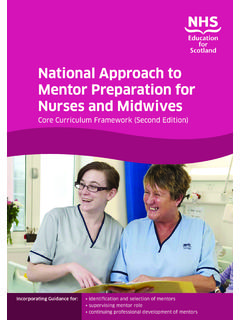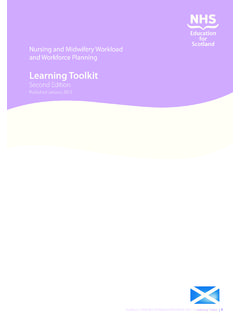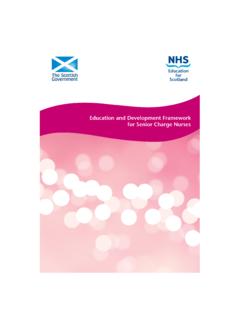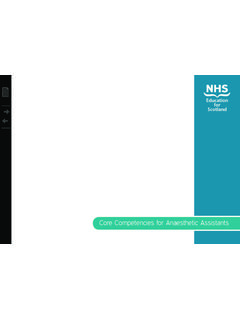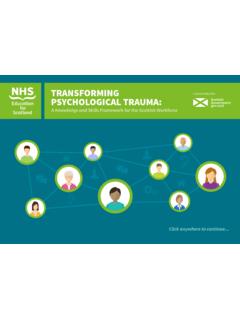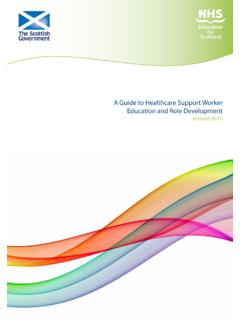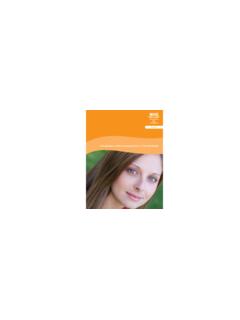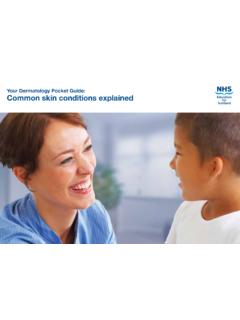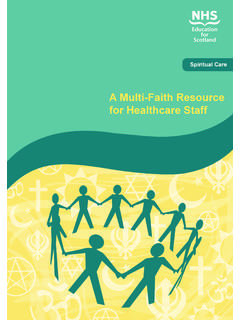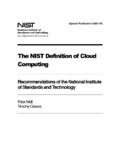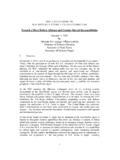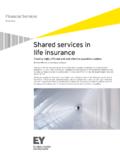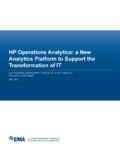Transcription of Realising Recovery Learning Materials - nes.scot.nhs.uk
1 Realising Recovery Learning MaterialsIntroductionRealising Recovery Learning MaterialsIntroduction page WelcomeWelcome to the Realising Recovery Learning materialsThese Learning Materials have been developed by NHS Education for Scotland (NES) and the Scottish Recovery Network (SRN). NES helps to improve care by providing educational solutions for workforce development. It does this by designing, commissioning, quality assuring and, where appropriate, providing education for NHS Scotland staff. SRN is part of the National Programme for Improving Mental Health and Wellbeing. The SRN aims to raise awareness that people can and do recover from long-term and serious mental health problems and to build an understanding of what helps people September 2007, NES and SRN published Realising Recovery : a National Framework for Learning and Training in Recovery Focused Practice (NES/SRN, 2007), which outlined the knowledge, skills and values that mental health workers need to develop their practice in Recovery focused ways.
2 This framework was one of a number of actions identified in the first review of mental health nursing in Scotland Rights, Relationships and Recovery : the Report of the National Review of Mental Health Nursing in Scotland (Scottish Executive, 2006). The Realising Recovery Framework included a commitment to develop national Learning Realising Recovery Learning Materials build on The 0 Essential shared capabilities (Scotland) (ESC(S)) Learning Materials published by NES in 2007 (NES, 2007). The 10 ESC(S) Learning Materials provide a firm foundation for the values base for mental health workers in Scotland.
3 The modules in this pack build on these foundations and address in more detail ESC 5 Promoting Recovery . Together, these Learning Materials offer all mental health workers opportunities to develop their knowledge, skills and values in ways that maximise the involvement of service users, embrace the belief that Recovery is possible and facilitate new relationships between people who use services and the communities they live Recovery Learning MaterialsIntroduction page 2 AcknowledgementsWe would like to thank and acknowledge the contribution made by the following people in developing the Learning module authors Module 1, Understanding Recovery Allison Alexander, NES/SRN Module 2.
4 Using Self to Develop Recovery Focused Practice Craig Hutchison, Health in Mind Module 3, Enabling Self-direction Simon Bradstreet, SRN and Susanne Forrest, NESM odule 4, Providing Person-centred Support Anne Conner, Outside the Box and Dr. Donald Macaskill, Equal and DiverseModule 5, Sharing Responsibility for Risk and Risk-taking Rachel Perkins and Kim Goddard, South West London and St George s Mental Health NHS TrustModule 6, Connecting with Communities Peter Bates, The National Development Team The expert group who guided the development of the materialsAllison Alexander NES/SRN Simon Bradstreet SRN Derek Barron NHS Ayrshire and Arran Scott Dyker NHS Grampian Susanne Forrest NES Bob Goupillot Penumbra Rona McBrierty Peer Specialist Support Worker and Trainer Dale Meller NHS Health Scotland Ivor Smith NHS Forth Valley Craig Stewart NHS Ayrshire and Arran The editorial group Allison Alexander NES/SRN Simon Bradstreet SRN Susanne Forrest NES Alex Mathieson Freelance Writer and Editor And finally.
5 We would also like to thank the narrators who shared their experiences of Recovery in the SRN narrative research and whose quotes appear throughout. Thanks also to Graham Morgan and Tig Davies for generously allowing us to use their accounts in these Learning Recovery Learning MaterialsIntroduction page ReferencesNHS Education for Scotland. (2007) The 10 Essential shared capabilities for Mental Health Practice: Learning Materials (Scotland). Edinburgh: NES. #valuesNHS Education for Scotland/Scottish Recovery Network. (2007) Realising Recovery : a National Framework for Learning and Training in Recovery Focused Practice.
6 Edinburgh: NES/SRN. Executive. (2006) Rights, Relationships and Recovery : the Report of the National Review of Mental Health Nursing in Scotland. Edinburgh: Scottish Executive. IntroductionRealising Recovery Learning MaterialsIntroduction page Introduction The Realising Recovery Learning Materials have been designed to support mental health workers to develop their Recovery focused practice. They build on The 0 Essential shared capabilities (Scotland) (ESC(S)) Learning Materials and are designed to provide further Learning to enable mental health workers to work alongside service users as they create their own unique Recovery journeys.
7 The Learning Materials will also be useful for mental health service users and carers either in their role as trainers involved in delivering the Learning or as learners exploring and developing their understanding of Recovery focused practice and what they can expect from mental health workers and drew on literature and evidence from a wide range of sources from across Scotland, the United Kingdom and internationally in developing these Learning Materials . Most importantly, however, the design of the Learning has been shaped by the lived experience of people in Scotland who identify themselves as in Recovery or recovered.
8 The findings of the Scottish Recovery Network s 2007 narrative research report Recovering Mental Health in Scotland have been used extensively in these Learning Materials . Direct narrator quotes from this research are presented in dark blue coloured font. We have also drawn on other accounts produced by people with lived experience, which are also presented in dark blue coloured Learning Materials are practical and action focused and provide links to wider reading and resources should you wish to explore issues in more Learning Materials are about:enabling workers to makes changes in their practice: we know that sometimes even small changes can have a hugely positive impact for workers themselves and on the experiences of service users and their friends, families and carers.
9 Supporting change by presenting key topic areas in relation to Recovery and practical guidance to help workers develop new roles, relationships and ways of working with service users and wider communities. IntroductionRealising Recovery Learning MaterialsIntroduction page Realising Recovery the modulesThe Learning Materials consist of six modules. At the start of each module, we estimate the number of hours it should take to complete. We also indicate how the level of study involved in the module links to the Scottish Credit and Qualifications Framework (SCQF). The module content and Learning outcomes have been developed to reflect a level of Learning that equates with Level 9 on the SCQF.
10 This is equivalent to the level of study you would undertake in the third year of an ordinary degree Recovery modulesModule 1 Understanding RecoveryModule 2 Using Self to Develop Recovery Focused PracticeModule 3 Enabling Self-directionModule 4 Providing Person-centred SupportModule 5 Sharing Responsibility for Risk and Risk-takingModule 6 Connecting with CommunitiesWe recommend that Modules 1, 2 and 3 be studied first and in numerical order. The remaining modules may be studied in order of is the best way to undertake this Learning ? We have designed the Materials so they can be studied in a way that involves elements of self-directed study and reflection, but we strongly recommend that opportunities for group discussions should be offered to help learners put individual experiences into a broader context and enhance the Materials could be delivered as an intensive, facilitated course delivered over a block of days, Learning will be enhanced if the Materials are studied over 6 8 weeks with space between modules for people to reflect on their Learning in the context of their workplace.
